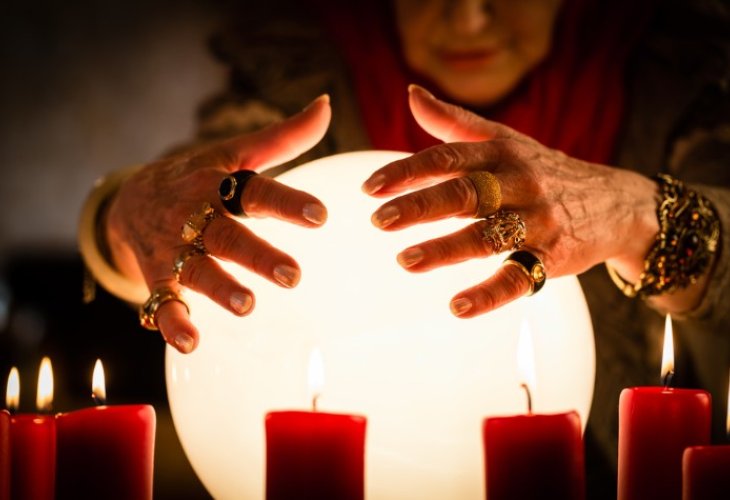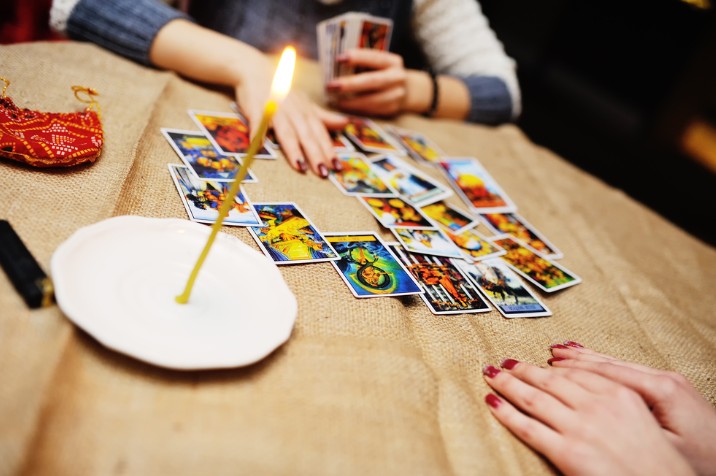Confessions of a Medium: "People Thought I Was Reading Tarot Cards. I Made It All Up."
Customers believed they were calling a famous medium, but ended up speaking with a 20-year-old who knew nothing about mysticism. Yet, it didn't stop her from inventing predictions and fortunes. The strange part? They always believed her.

You've probably heard of these services: a medium that offers you angelic advice over the phone, a website that reads tarot cards to predict if your new relationship will succeed, or a fortune teller providing fast online services to prepare you for the upcoming year... Even though scientific advancements have reached new heights in our time, they haven't diminished the success of the mysticism and superstitions industry. Quite the opposite—this industry seems to be flourishing more than ever in our uncertain age. It's no longer surprising when it's revealed that Shula Zaken consulted a medium before acting in the Olmert trial, or that Russian politicians regularly sought advice from the Bulgarian fortune teller Baba Vanga. Considering the success rates of lawyers or public opinion polls, who says a mysterious mystic isn't a better consultant?
What is less known is how easy it is to fall victim to the widespread charlatanism in the field. The regular clients of various mediums and mystics enrich them with money out of naive belief in their supposed extraordinary spiritual powers. Even when external, objective factors point out contradictions or failures that should weaken belief in the mystic, loyal customers often refuse to listen. Such was the case with Miss Cleo, a famous American medium who recently passed away.
Miss Cleo was a struggling single mother and failed theater producer when she finally found a profitable job in the late 90s: working for the American Psychic Readers Network, a company offering mystical consultation services via phone. She adopted a Jamaican shaman persona, faked her biography, practiced a bogus accent, and starred in all the company’s advertisements. Her mysterious aura was so convincing that her company enjoyed unprecedented success. Her ads, sent via email, had a simple message: "Miss Cleo reads cards especially for you, but you must call immediately!"
Those who called usually didn’t get to speak with Miss Cleo. Who did they talk to? For instance, with Bent Madison, a young American woman who recently shared her memories in the 'New York Times' of working for the card reading network.

"It was 2001. I had just finished my second year in college and was living with friends in a small apartment... I needed to pay $600 in rent and was completely broke..." Desperate for a job, she was elated when her friend Heidi found a newspaper ad for 'phone actors'. The girls called the number and discovered it was a job for Miss Cleo’s network. "Her message was famous: 'Call me now!' But instead, people called me. That summer, whenever I could, I stayed up all night, smoking and drinking wine, as I dispensed horoscopes and futures over the phone. For some reason, the customers, expecting Miss Cleo, weren’t bothered to find a depressed, clueless twenty-year-old instead.
"Since I wasn’t really a medium, the company provided me a minimal script and tarot card reading software to use. But I didn’t rely on either; I simply improvised during the conversations.
"Sometimes, I adopted a persona I invented to feel genuinely enchanted. Sometimes I was Cassandra, a husky southern woman who called everyone 'honey'. Other times I was Gabriella, a quirky medium with a French accent. Customers generally preferred Cassandra, but I could only keep her up for a call or two at a time—she strained my throat too much".
One might logically expect that at least some customers would realize they were talking to an imposter with no idea about readings or tarot. Bent herself was sure her truth would eventually be exposed. But it never happened. "Most callers were prepared to believe anything I said. The idea was to throw a bunch of associations at them and hope something resonated. One woman asked who her soulmate was. I told her the spirits sent me an image of a star. "Maybe you'll meet him at the planetarium," I suggested. After a few moments of silence, she replied in amazement: 'My ex-husband is a sheriff. You know, with a star on his badge.' Without missing a beat, I said: 'Exactly. Go back to him. He is your true partner.' I was pleased with myself. I didn’t think my random advice would have consequences. Who would take me seriously?"
Bent began to temper her advice only after a boss at another job, where she managed rejection letters for a publishing house, told her to write less polite rejection letters. "If you're too nice," she said, "they never stop pestering you. And it's cruel to give people false hope." Bent continued to write considerate rejection letters but became more cautious with her predictions. She stopped telling people they would win great fortunes and instead advised, "This card tells me you should build a responsible budget and stick to it, and in the meantime, look for temporary work." Suddenly, her calls started ending much quicker.
How does she explain the callers' willingness to let themselves be duped? "Most of our customers were desperate and sad. They were about to be evicted from their homes. They were on the brink of losing custody of their children. They were willing to pay by the minute to talk to a stranger. The fact that the stranger was me started to feel cruel. It wasn't worth it... I quit the job."
Bent Madison’s confession ending explains more than anything the irrationality that characterizes seekers of answers in mysticism. "Recently, my friends have taken an interest in witchcraft, and they aren't exactly joking when they say it... I learned to read tarot cards, for myself this time... Miss Cleo died last July from cancer. Everyone joked: 'She probably didn’t see that coming.' I thought: 'What a silly joke... maybe she did see it coming?
"I know better than anyone that Miss Cleo was a charlatan. Yet, I somehow always kept believing in her"...

